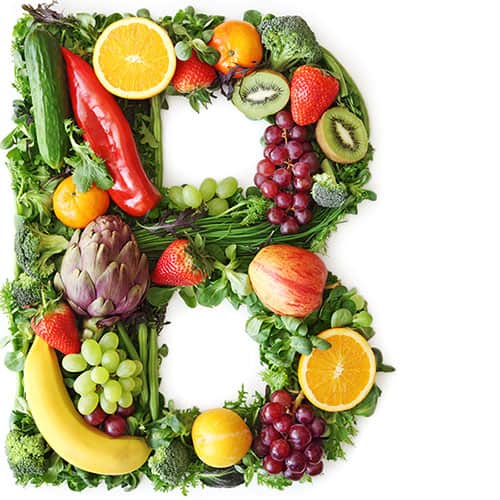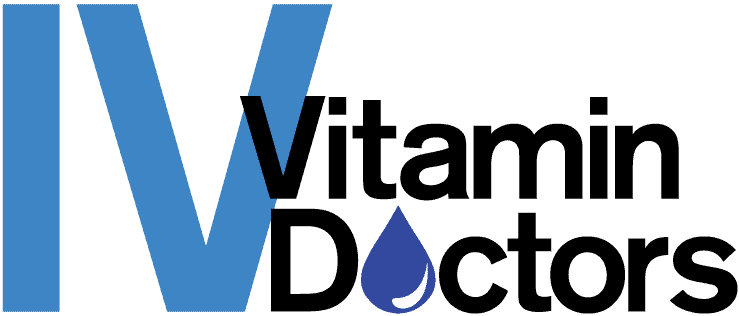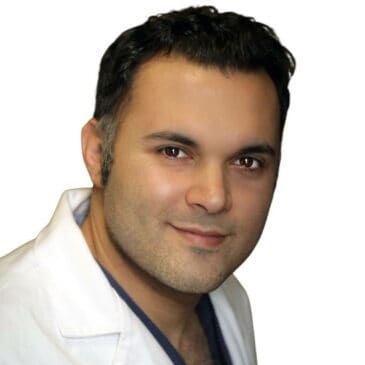What is vitamin B?
Vitamin B refers to several different types of vitamins that, together, are known as B-complex vitamins. There are eight kinds of vitamins in the B complex group: thiamin (B1), riboflavin (B2), niacin (B3), pantothenic acid (B5), pyridoxine (B6), biotin (B7), folate (B9), and cobalamin (B12).

What does vitamin B-complex do?
The B-complex vitamins play vital roles in many essential processes.
These vital processes include:
- Blood cell production
- Neurological function
- Cell signaling
- DNA production and repair
- Amino acid metabolism
In addition to these functions, the B family of vitamins helps reduce stress, relieve anxiety, prohibit memory loss, and lower heart disease risk.
At IV Vitamin Therapy, our vitamin B IV drips are optimal for maintenance of a healthy lifestyle, with minimal side effects and no recovery time

Is vitamin B-complex a water-soluble or fat-soluble vitamin
Water-soluble and fat-soluble vitamins act differently and function differently when the body needs them.
- Fat-soluble vitamins are stored in the body’s fat tissue and liver for use when needed.
- Water-soluble vitamins dissolve in water and are not stored in the body. They enter the bloodstream, and whatever the body doesn’t use is eliminated via urination.
B-complex vitamins are “water-soluble vitamins” needed for red blood cell metabolism, DNA synthesis, energy, and cognitive function.
Why get IV vitamin B therapy?
As you’ll see, most B vitamins can be easily obtained through diet. So why bother with IV therapy?
Unfortunately, many people can’t (or don’t) eat as well as they should. People on vegan or vegetarian diets often miss out on important vitamins in meat and dairy products.
Another risk factor for B vitamin deficiencies is absorption issues. People with Crohn’s disease, celiac disease, pancreatic insufficiency, autoimmune gastritis, or other problems of the intestines may not fully absorb nutrients from their food. People who’ve had gastric bypass surgery also absorb fewer nutrients from their food as their intestinal tract has been shortened by the surgery.
Older people are also at risk of vitamin deficiencies as absorption of some nutrients declines with age.
IV vitamin therapy allows us to infuse high doses of necessary B vitamins directly into the bloodstream. From there, the body can redirect the vitamins to where they’re needed most. Unlike oral multivitamins, IV infusion bypasses the digestive system; so any absorption problems are avoided.
Check with your healthcare provider before beginning any vitamin supplementation.
What are vitamin B deficiency symptoms?
The symptoms of a vitamin B deficiency vary depending on which B vitamin you’re deficient in. Some foods are high in several B vitamins, and certain foods are particularly high in specific B vitamins. Eating a balanced diet is key to getting all the vitamins you need.
Symptoms of vitamin B deficiency often include fatigue and confusion.
What is vitamin B1 (thiamin)?
Vitamin B1 converts carbohydrates into energy. It is essential for glucose metabolism and plays a key role in nerve, muscle, and heart function. Vitamin B1 prevents complications in the nervous system, brain, muscles, heart, stomach, and intestines. It is also involved in the flow of electrolytes into and out of muscle and nerve cells.
It is easy to maintain thiamin levels with a balanced diet. B1 is found in whole grains, fortified bread, cereal, pasta, and rice as well as seeds, nuts, and legumes. However, even with a balanced diet, patients with gastrointestinal disorders – such as ulcerative colitis, Crohn’s disease, or irritable bowel syndrome – may have problems absorbing adequate vitamin B1 through food alone.
Early symptoms of thiamin deficiency may include:
- weight loss
- anorexia
- confusion
- short-term memory loss
- muscle weakness
What is vitamin B2 (riboflavin)?
Vitamin B2 is naturally present in foods, added to foods, and available as a supplement. Bacteria in the gut can produce small amounts of vitamin B2, but not enough to meet dietary needs.
Riboflavin is a key component of substances involved in cell growth, energy production, and the breakdown of fats, steroids, and medications.
Riboflavin is found mostly in meat and fortified foods but also in some nuts and green vegetables. Despite being found in vegetables, people with a vegan diet are at risk of B2 deficiency because they don’t eat meat or dairy products. People with thyroid disorders are also at risk of a deficiency. Riboflavin deficiency most often occurs with other nutritional deficiencies.

Riboflavin deficiency can have extra consequences for pregnant people. Pregnant women who are riboflavin deficient may be at higher risk for high blood pressure and fluid retention. Riboflavin is also essential for bone, muscle, and nerve development in the fetus.
What is vitamin B3 (niacin)?
Vitamin B3 is found naturally in some food and is fortified in others. Niacin works with enzymes to increase the rate of chemical reactions in the body. It converts food into energy, creates cholesterol and fat, synthesizes and repairs DNA, and initiates antioxidant effects (neutralizes free radicals that damage cells).
Niacin deficiency is rare because it is found in many plant and animal food products.
Groups at risk for niacin deficiency:
- Limited diet — the most common cause of any deficiency is poor diet. Niacin deficiency can occur in people whose diets are limited in both variety and quantity, such as those living in poverty, or who are very ill. Developing countries that eat corn or maize as the main food source are at risk for pellagra (a disease caused by low niacin), as these foods are low in vitamin B3.
- Carcinoid syndrome — is a disease of slow-growing cancer cells in the gut that cause tryptophan in the diet to be converted into serotonin rather than niacin.
What is vitamin B5 (pantothenic acid)?
Vitamin B5 has many important functions in the body. B5 is involved in:
- converting food into energy
- synthesizing cholesterol
- the formation of sex and stress-related hormones
- the formation of healthy red blood cells
- metabolizing fat, carbohydrates, and proteins
- metabolizing drugs and other toxins safely
Vitamin B5 is widely found in both animal and plant products, therefore, a deficiency is extremely rare. A balanced diet will provide normal, healthy levels
Purchase Any 4 IV's
Or Injections & Get The 5th Complimentary
Call +1-877-760-3564
Or Click Here to Send Us Email

What is vitamin B6 (pyridoxine)?
Vitamin B6 is important for normal brain development and the maintenance of healthy nervous and immune systems.
Vitamin B6 is found naturally in poultry, fish, potatoes, chickpeas, and bananas, fortified in cereal, and can be taken as a dietary supplement.
A vitamin B6 deficiency occurs in the following conditions:
- Kidney disease
- Conditions that prevent the small intestine from absorbing nutrients from food (malabsorption syndromes)
- As a side effect of epilepsy medication
- Alcohol dependence
The symptoms of a vitamin B6 deficiency include anemia, confusion, depression, and a weakened immune system.
What is vitamin B7 (biotin)?
Biotin is found in foods such as eggs, milk, and bananas. It can also be produced by your natural gut bacteria. Biotin deficiency can cause thinning hair and a rash around the eyes, nose, and mouth.
Before taking biotin supplements it is important to tell your doctor, as it can interfere with the results of certain blood tests.
What is vitamin B9 (folic acid)?
Folic acid (folate) is naturally present in many foods. The body needs folic acid for DNA synthesis and cell division. Some food is fortified with folate, and it can be found in supplements.
Folic acid is naturally present in beef liver, vegetables, citrus fruits, nuts, beans, and peas. Certain food is fortified with folic acid such as bread, flour, pasta, rice, and breakfast cereal. Most people in the United States get enough folic acid in their diet, and deficiency is rare.
Increased B9 intake is especially important for pregnant and breastfeeding parents. Folate deficiency increases the risk of birth defects affecting the brain and spinal cord – such as neural tube defects.
The daily recommended intake of folate is 200 micrograms. People who are pregnant, could get pregnant, or are trying to get pregnant should increase their intake to 400 mcg of folate a day.
What is vitamin B12?
Vitamin B12 (cobalamin or cyanocobalamin) is associated with the following processes in the body:
- red blood cell formation
- brain and nerve function
- DNA synthesis
- conversion of food into energy

Vitamin B12 is only found in animal products such as meat, milk, and eggs. To ensure people are getting enough vitamin B12, cereals and bread are also fortified with B12.
Vitamin B12 is closely linked with folic acid (vitamin B9); both are involved in DNA synthesis and red blood cell formation. Lack of vitamin B12 and folic acid can lead to megaloblastic anemia (abnormally large red blood cells) and immature, abnormal white blood cells.
Pernicious anemia is a rare medical condition that causes insufficient vitamin B12 levels. This is due to a deficiency of intrinsic factor in the stomach – a protein necessary for B12 absorption – and is often hereditary.
Vitamin B12 is involved in the conversion of one form of protein to another. When the conversion doesn’t occur, there are higher levels of homocysteine which increases the risk of a heart attack.
Symptoms of vitamin B12 deficiency include:
- Muscle weakness
- Numb or tingling feeling in hands and feet
- Difficulty walking
- Nausea
- Decreased appetite and weight loss
- Irritability
- Lack of energy
- Diarrhea
- Smooth and tender tongue
- Heart palpitations
- Cognitive impairment
The incidence of vitamin B12 deficiency increases in older adults.
Heartburn medications called proton pump inhibitors (Nexium, Prevacid, and Prilosec OTC) interfere with vitamin B12 absorption. Metformin (a drug used to manage diabetes) also interferes with the absorption of B12.
At IV Vitamin Therapy, a vitamin B12 IV drip — which can be combined with other vitamins — is a powerful tool to maintain a healthy body. It can have a noticeable impact on energy level, boost the immune system, improve brain function, and maintain healthy skin.
Why is IV Vitamin Therapy the best in Beverly Hills?
Dr. David Nazarian is board certified in internal medicine and highly trained in the field of traditional and alternative medicine. He has been utilizing IV fluids and vitamin replacement therapies in conjunction with other treatment modalities to treat a variety of medical illnesses and conditions for over 10 years.
Our medical office follows strict guidelines and standards to ensure each patient receives the highest quality sterile vitamins compounded from the best pharmacies only. Our IV drip clinic utilizes only the very best vitamins purchased only from the best pharmacies and thus ensures that it has gone through a set of sterile processes, and quality assurances that meet our highest standards.
We are confident that if you have received IV vitamin treatments in the past at other places you will recognize the difference between our vitamins, our facility, and our practice.
Where can I get IV therapy near me?
Busy? Our mobile IV therapy will come to you. Many of our clients who prefer to receive injections in the privacy of a home, hotel room, or office can choose our popular concierge house call service for mobile IV.
IV Vitamin Therapy is conveniently located in Beverly Hills and can provide IV services throughout the Los Angeles area. We serve patients near Beverly Hills, Bel Air, West Hollywood, Santa Monica, West Los Angeles, Culver City, Hollywood, Venice, Marina del Rey, Malibu, Manhattan Beach, Redondo Beach, Downtown Los Angeles, Encino, Woodland Hills, Sherman Oaks, Calabasas, Burbank, Glendale, Hidden Hills, Agoura Hills, Northridge, North Hollywood, Topanga, Canoga Park, Reseda, Valley Glen, Chatsworth, West Hills, Orange County, Winnetka, Universal City, Silverlake, and Echo Park.
Book now at 855-999-5577
Purchase Any 4 IV's
Or Injections & Get The 5th Complimentary
Call +1-877-760-3564
Or Click Here to Send Us Email


